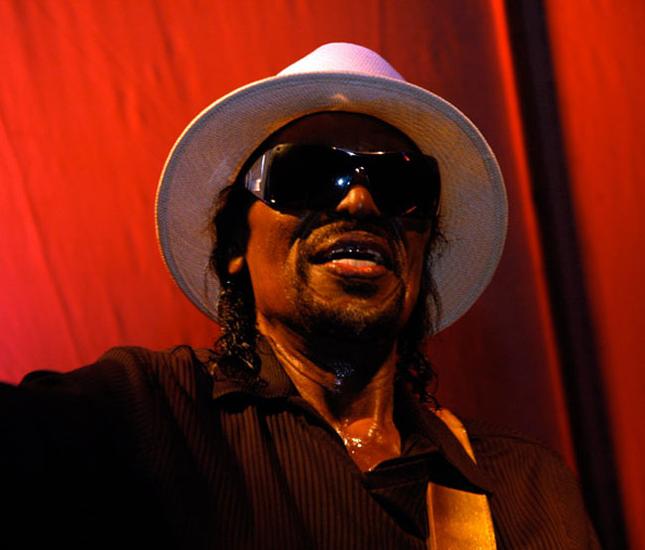Godfather of Go-Go Passes Away at the Age of 76
By • May 24, 2012 0 1110

Live long enough in D.C. and you ended up hearing about, hearing and finally seeing Chuck Brown. If you didn’t live in the epicenter of Brown’s influence—where go-go music was as much a part of the culture as the air you inhaled—Chuck Brown and his marvelous musical invention was something of a rumor, a kind of urban legend in the outlying world, which sooner or later you would run across. And when you did, everything about him and the music turned out to be true.
Chuck Brown—the Godfather of Go-Go, the President, the Legend—passed away mid-week, and the city erupted. Not in tears, mind you, but in a kind of Bourbon Street and bar celebration, on the airwaves, in bars, outside the newly renovated Howard Theatre, in the U Street Corridor, around Ben’s Chili Bowl. It was a spontaneous, entirely appropriate reaction to sad news, like a call-and-response at a Baptist church, the kind that also permeated his music.
Brown was an inventor, and his invention was go-go music. Loud, endlessly energetic, full of drums, cymbals, clanging bells, brass, bongos, employing instruments that might be heard in Beirut or Africa, not Bayreuth. It made you want to, well, go-go. Go-go was the music of the city—not Capitol Hill, that white dome and pillars stuff, but the encompassing city of neighborhoods: the open-the-hydrants-in-summertime scene, the club on Saturday and church on Sunday neighborhood scene, where get-up-and-go dance is an urge.
Natty, sunglassed and hatted to a tee, Brown was a generous soul, always helping out up-and-comers from the next generation who spread the word and the music around the city. In some portions of my neighborhood in Adams Morgan he was a prophet. I knew this from my next-door-neighbor, Mickey Collins, who is three years gone now.
Still, in some ways, among the myriad neighborhoods of Washington, some each sporting their own history and culture, Brown and go-go might have been more like a legend or rumor, something not actually experienced in the age of disco, Michael Jackson, and Hall and Oates. Go-go was not exactly like jazz and its rich history in D.C. It wasn’t necessarily a fully shared experience.
Just ask Anthony Williams, Mayor of Washington, D.C., for eight years. He was a cerebral sort of man, famous for his bowtie, who tended toward jazz and classical music. When prompted, he had to admit he didn’t know what go-go was. A sort of mini-tempest emerged from this, culturally and politically, not long lasting but indicative of some of the divisions in the city.
Go-go and Brown, except for “Bustin’ Loose,” never exploded nationally the way it should have, but maybe that’s all right. Brown was ours, and so was go-go. It belonged to this city, and every year the Brown and go-go effect grew wider. It was a peculiar thing: even before his death at 75 from pneumonia brought on by blood clot issues, Brown and his music were becoming institutionalized into our culture, busting loose across all the neighborhoods and beyond.
Like I said, I’d heard the rumors, riffs and stories for years. But I never saw the man until I ventured out to Strathmore in Bethesda for one of its free summer outdoor music concerts.
It was Chuck Brown, and the night, blue skies, big stars, rolling grass, Rockville Pike strip mall lights, barbecues and such, rendered it a different Strathmore than it is today—more the dreams of one city every politician seems to share but never achieves, gathered in force together on the lawn.
He was 70 then, but you wouldn’t know it. What he and his band were doing was incorrigible. It was seductive, it was joyful, it was kickin’, it was holy happening, stomp your feet, clap your hands stuff, and not in a childish way. I guess go-go is as good a description as any because that’s what it made you want to do.
And Brown never stopped. He took a sip of water here and there, but, man, he played and could have played all night long. He kept going and shamed you into sharing the experience, like in James Brown’s music. You felt good.
At the end of the show, everybody was in the summer’s night place, sweating like a pack of dogs, shook it off and went on home, exhausted and more than a little exhilarated. We got home and my neighbor Mickey was outside. He asked where we’d been, because for all I know we glowed in the dark.
We told him.
He was impressed. “Chuck Brown?” he said, tinged with a little envy. “Wow. That’s something. That’s something, isn’t it?” We agreed.
If Chuck Brown was the Godfather of go-go, under my neighbor’s eye, I felt like a made man.
Somewhere else now, Chuck Brown is bustin’ out. I just hope they’re ready up there.

